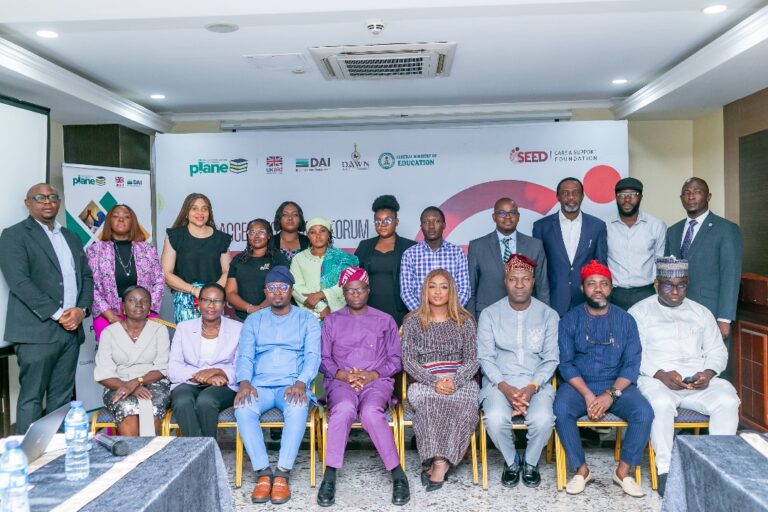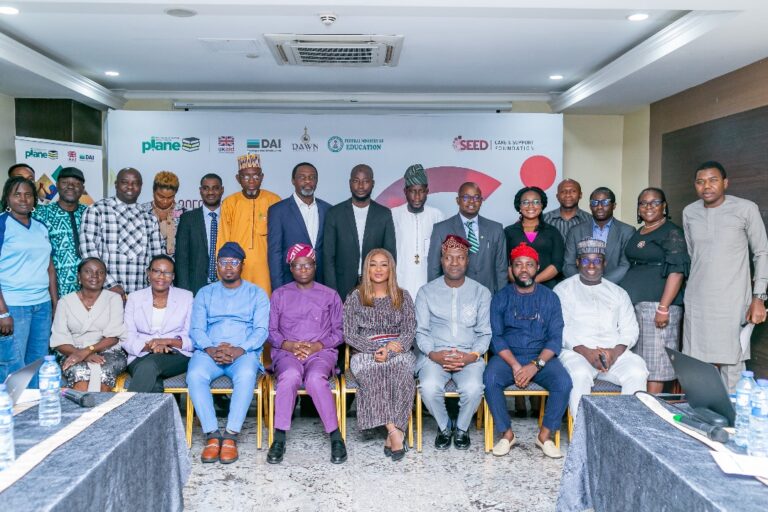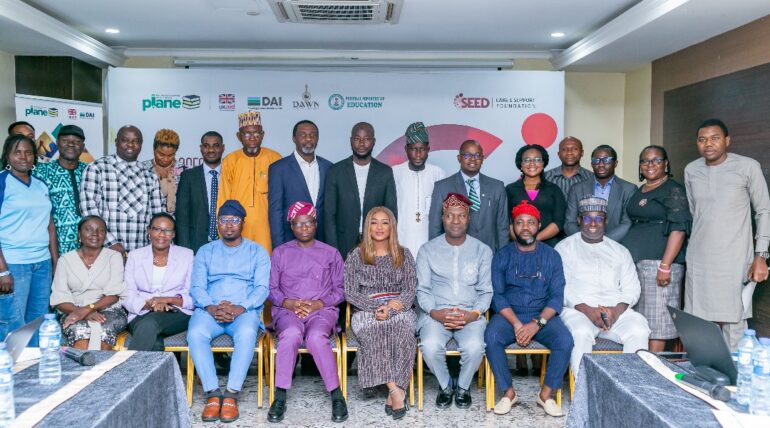
March 25, 2025
- seedfoundation
- Leave a Comment on SEED Access to Finance Forum 2025 – Advancing Financial Inclusion for Nigeria’s Affordable Non-State Education Sector
SEED Care and Support Foundation, a prominent voice in Nigeria’s affordable non-state education sector, brought together stakeholders for the third Access to Finance Forum in Lagos on ways to explore ‘Accelerate Action on Financing for Affordable Non-State Education in Nigeria.’
The Access to Finance forum held March 19, 2025, was in alliance with the Partnership for Learning for All in Nigeria (PLANE) – a seven-year programme funded by the United Kingdom Government and implemented by DAI. The Forum was also supported by Development Agenda for Western Nigeria (DAWN) Commission and the Federal Ministry of Education.
A Gathering of Key Stakeholders – One Event, 44 Participants, 19 Stakeholders, 6 Associations of Affordable Non-State Schools
The event brought together 44 participants together across educational sector including Office of the Vice President, Commercial Banks, Microfinance Banks/Institutions, Mortgage Banks, Credit Bureau, Ed-tech Finance, Philanthropists, and NGOs, and Development Partner.
Associations of affordable non-state schools present at the deliberation include Association for Formidable Educational Development (AFED), League of Muslim School Proprietors (LEAMSP), Association of Model Islamic Schools (AMIS), Muslim School Proprietors Association (MUSPASS), Association of Private School Owners of Nigeria (APSON), National Association of Proprietors of Private Schools (NAPPS).
Discussions at the forum centered on challenges faced by affordable non-state schools, hassle process to access finance, provision of funding support by financial institutions and action plan from the discourse.
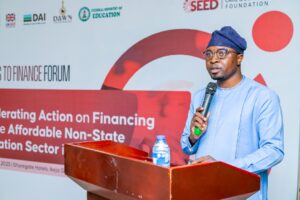
On behalf of His Excellency, President Bola Ahmed Tinubu, Vice President Senator Kashim Shettima & Technical Advisor to the President on Economic & Financial Inclusion, Dr. Nurudeen Abubakar Zauro (represented by Ibrahim Kyuka A., Director, Digital Enablement, Presidential Committee on Economic & Financial Inclusion [PreCEFI]) reaffirmed government’s commitment to addressing economic & financial inclusion as a critical national priority.
A significant milestone in this journey was the signing of the ASO ACCORD in April 2024, an initiative aimed at democratizing financial access, empowering entrepreneurs, and stimulating sustainable economic growth particularly at the grassroots level while enhancing the quality and usage of financial services through economic empowerment. With the alignment between PLANE, SEED, and the government’s financial inclusion agenda, there is potential for meaningful collaboration to improve education and economic opportunities. He described the Access to Finance Forum as a deepened conversation for the government and expressed that the government looks forward to partner, collaborate, towards promoting quality education in the country.
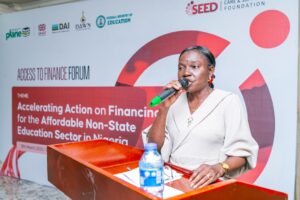 Representing the Ministry of Basic and Secondary Education, Office of Education Quality Assurance, Dr. Ogunmuyiwa Sulaimon, Director of the Department of Private Education and Special Programs, Mrs. Oyedele O.A., Head of Department, Private Education and Special Programs reaffirmed the Ministry’s commitment to affordable non-state schools. She shared the Ministry’s plan to identify and integrate them into the state’s education system, ensuring they benefit from government-provided opportunities. Recognizing the need for comprehensive data collection, the Honourable Commissioner for Basic and Secondary Education initiated the School Registration and Grading process, which also serves as a way for schools to access government support and interventions.
Representing the Ministry of Basic and Secondary Education, Office of Education Quality Assurance, Dr. Ogunmuyiwa Sulaimon, Director of the Department of Private Education and Special Programs, Mrs. Oyedele O.A., Head of Department, Private Education and Special Programs reaffirmed the Ministry’s commitment to affordable non-state schools. She shared the Ministry’s plan to identify and integrate them into the state’s education system, ensuring they benefit from government-provided opportunities. Recognizing the need for comprehensive data collection, the Honourable Commissioner for Basic and Secondary Education initiated the School Registration and Grading process, which also serves as a way for schools to access government support and interventions.
Challenges Facing Affordable Non-State Schools
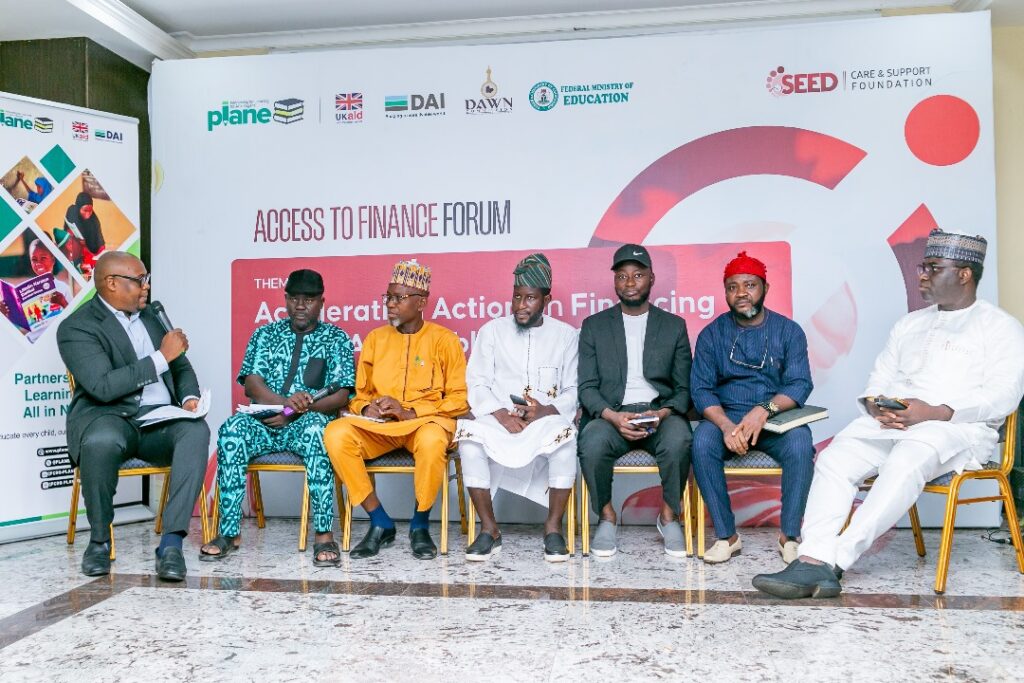
A key highlight of the forum was a panel discussion featuring representatives from school associations. They outlined the pressing issues affecting their financial sustainability:
Some of the challenges highlighted by the associations include:
- Lack of access to financial institutions willing to support the education sector
- Marginalisation of education in banking policies
- Regulatory inefficiencies
- Rising inflation impacting operational costs
- Stringent requirements for loan accessibility
Stating that granting financial access to schools will result to growth in numerous sectors, the associations noted that these challenges have become a thorn in the flesh of the schools to grow.
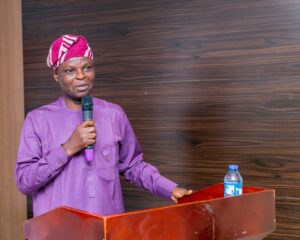
Dr. Gboyega Ilusanya, FCDO-PLANE National Team Lead, delivered a presentation on DEEPEN’s (Developing Effective Private Education Nigeria) past findings regarding “Access to Finance”. Moving forward, it remains imperative to ensure sustained engagement and consistent follow-through to develop financial solutions that effectively support the education sector. He stressed that a critical takeaway from this event should be the strategic alignment between demand and supply. Establishing and fostering meaningful relationships with the financial institutions present is essential to ensure that discussions initiated here extend beyond this forum.
Case Studies: The Reality on the Ground
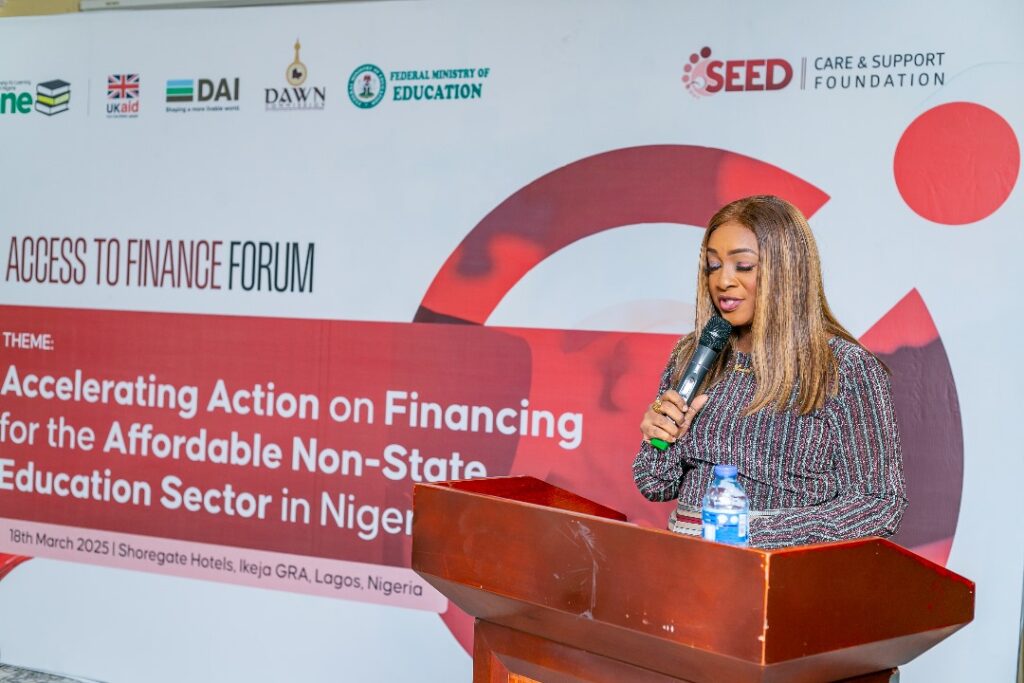
In her presentation, Mrs. Olanrewaju Oniyitan, Founder and Executive Director of SEED Care and Support Foundation presented real-life case studies of non-state schools in Lagos, including All Round Positive in Badagry and Skye-View College in Oworoshonki. These institutions struggle with financial barriers at the approval stage, underscoring the need for more inclusive financing models.
While noting that traditional financing structures are insufficient to support the sector’s needs, she called on stakeholders to develop innovative financing models tailored to affordable non-state schools, leverage non-traditional credit metrics and emerging data to de-risk the sector, blend commercial capital, patient intervention funds, and catalytic grants to sustain growth, and align policy frameworks with sector-specific financing realities as part of transforming the landscape.
Action Plan: A Roadmap for Financial Inclusion
At the close of the forum, stakeholders established concrete action plans to drive progress:
- Engage the Office of the Vice President on the “Call to Action” points highlighted in the presentations.
- Co-create solutions with the financial institutions as a result of their readiness to now engage with affordable non-state schools, following the new Lagos State Ministry of Basic & Secondary Education School Registration & Grading process.
- Partner with the Department of Private Education & Special Programmes, OEQA, Lagos State Ministry of Basic & Secondary Education to support the registered and graded affordable non-state schools with technical and financial support towards fast-tracking their approval.
- Scale the Access to Finance intervention to all Southwest States in Nigeria and thereafter across the country.
The message from the Access to Finance Forum 2025 is clear: Nigeria’s affordable non-state schools are ready to grow but they need financial systems that recognize and support their unique realities.
We call on government agencies, financial institutions, development partners, philanthropists, and policymakers to join forces in transforming education for low-income schools. It’s time to unlock real, sustained funding for schools that serve millions of Nigeria’s children.
To be a part of this, contact SEED Care and Support Foundation to join help ensure no school is left behind because of lack of access to finance. Together, we can finance the future of education—one inclusive model at a time.
